Dear Zazie, Today’s Lovers’ Chronicle from Mac Tag to his muse. Follow us on twitter @cowboycoleridge. Rhett
The Lovers’ Chronicle
Dear Muse,
© copyright 2020 mac tag/cowboy coleridge all rights reserved
stayin’ close, lookin’
and in the contact
pleases well
our bodies
all that was
comes back,
engirds us
with all
that can be
© copyright 2019 mac tag/cowboy coleridge all rights reserved
the richness, the depth, the…
always lookin’ forward
to the next time,
another view
where i can ponder
and muse and fully take in
the thoughts that sustain
© copyright 2018 mac tag/cowboy coleridge all rights reserved
Today is the birthday of Nathaniel Hawthorne (Salem, Massachusetts; July 4, 1804 – May 19, 1864 Plymouth, New Hamlpshire); novelist, dark romantic, and short story writer.
He entered Bowdoin College in 1821 and graduated in 1825. He published his first work in 1828, the novel Fanshawe; he later tried to suppress it, feeling that it was not equal to the standard of his later work. He published several short stories in periodicals, which he collected in 1837 as Twice-Told Tales. The next year, he became engaged to Sophia Peabody. He worked at the Boston Custom House and joined Brook Farm, a transcendentalist community, before marrying Peabody in 1842. The couple moved to The Old Manse in Concord, Massachusetts, later moving to Salem, the Berkshires, then to The Wayside in Concord. The Scarlet Letter was published in 1850, followed by a succession of other novels. A political appointment as consul took Hawthorne and family to Europe before their return to Concord in 1860. Hawthorne died on May 19, 1864, and was survived by his wife and their three children.
Much of Hawthorne’s writing centers on New England, many works featuring moral metaphors with an anti-Puritan inspiration. His fiction works are considered part of the Romantic movement and, more specifically, dark romanticism. His themes often center on the inherent evil and sin of humanity, and his works often have moral messages and deep psychological complexity. His published works include novels, short stories, and a biography of his college friend Franklin Pierce, the 14th President of the United States.


While at Bowdoin, Hawthorne wagered a bottle of Madeira wine with his friend Jonathan Cilley that Cilley would get married before Hawthorne did. By 1836, he had won the bet, but he did not remain a bachelor for life. He had public flirtations with Mary Silsbee and Elizabeth Peabody, then he began pursuing Peabody’s sister, illustrator and transcendentalist Sophia Peabody. He joined the transcendentalist Utopian community at Brook Farm in 1841, not because he agreed with the experiment but because it helped him save money to marry Sophia. He left later that year, though his Brook Farm adventure became an inspiration for his novel The Blithedale Romance. Hawthorne married Sophia Peabody on July 9, 1842 at a ceremony in the Peabody parlor on West Street in Boston. The couple moved to The Old Manse in Concord, Massachusetts. His neighbor Ralph Waldo Emerson invited him into his social circle, but Hawthorne was almost pathologically shy and stayed silent at gatherings. At the Old Manse, Hawthorne wrote most of the tales collected in Mosses from an Old Manse.
The Hawthornes enjoyed a long and happy marriage. He referred to her as his “Dove” and wrote that she “is, in the strictest sense, my sole companion; and I need no other—there is no vacancy in my mind, any more than in my heart… Thank God that I suffice for her boundless heart!” Sophia greatly admired her husband’s work. She wrote in one of her journals:
I am always so dazzled and bewildered with the richness, the depth, the … jewels of beauty in his productions that I am always looking forward to a second reading where I can ponder and muse and fully take in the miraculous wealth of thoughts.
Poet Ellery Channing came to the Old Manse for help on the first anniversary of the Hawthornes’ marriage. A local teenager named Martha Hunt had drowned herself in the river and Hawthorne’s boat Pond Lily was needed to find her body. Hawthorne helped recover the corpse, which he described as “a spectacle of such perfect horror … She was the very image of death-agony”. The incident later inspired a scene in his novel The Blithedale Romance.


Failing health prevented him from completing several more romances. Hawthorne was suffering from pain in his stomach and insisted on a recuperative trip with his friend Franklin Pierce, though his neighbor Bronson Alcott was concerned that Hawthorne was too ill. While on a tour of the White Mountains, he died in his sleep on May 19, 1864 in Plymouth, New Hampshire. Pierce sent a telegram to Elizabeth Peabody asking her to inform Mrs. Hawthorne in person. Mrs. Hawthorne was too saddened by the news to handle the funeral arrangements herself. Longfellow wrote a tribute poem to Hawthorne published in 1866 called “The Bells of Lynn”. Hawthorne was buried on what is now known as “Authors’ Ridge” in Sleepy Hollow Cemetery, Concord, Massachusetts. Pallbearers included Longfellow, Emerson, Alcott, Oliver Wendell Holmes Sr., James Thomas Fields, and Edwin Percy Whipple. Emerson wrote of the funeral: “I thought there was a tragic element in the event, that might be more fully rendered—in the painful solitude of the man, which, I suppose, could no longer be endured, & he died of it.”
His wife Sophia and daughter Una were originally buried in England. However, in June 2006, they were reinterred in plots adjacent to Hawthorne.
The Scarlet Letter (1850)
- It contributes greatly towards a man’s moral and intellectual health, to be brought into habits of companionship with individuals unlike himself, who care little for his pursuits, and whose sphere and abilities he must go out of himself to appreciate.
- Introduction: The Custom-House
- It is a good lesson — though it may often be a hard one — for a man who has dreamed of literary fame, and of making for himself a rank among the world’s dignitaries by such means, to step aside out of the narrow circle in which his claims are recognized, and to find how utterly devoid of all significance, beyond that circle, is all that he achieves, and all he aims at.
- Introduction: The Custom-House
- If a man, sitting all alone, cannot dream strange things, and make them look like truth, he need never try to write romances.
- Introduction: The Custom-House
- The moment when a man’s head drops off is seldom or never, I am inclined to think, precisely the most agreeable of his life. Nevertheless, like the greater part of our misfortunes, even so serious a contingency brings its remedy and consolation with it, if the sufferer will but make the best, rather than the worst, of the accident which has befallen him.
- Introduction: The Custom-House
- In view of my previous weariness of office, and vague thoughts of resignation, my fortune somewhat resembled that of a person who should entertain an idea of committing suicide, and, altogether beyond his hopes, meet with the good hap to be murdered.
- Introduction: The Custom-House
- The founders of a new colony, whatever Utopia of human virtue and happiness they might originally project, have invariably recognized it among their earliest practical necessities to allot a portion of the virgin soil as a cemetery, and another portion as the site of a prison.
- Chapter I: The Prison Door
- On the breast of her gown, in fine red cloth, surrounded with an elaborate embroidery and fantastic flourishes of gold thread, appeared the letter A.
- Chapter II: The Market-Place
- In our nature, however, there is a provision, alike marvelous and merciful, that the sufferer should never know the intensity of what he endures by its present torture, but chiefly by the pang that rankles after it.
- Chapter II: The Market-Place
- My heart was a habitation large enough for many guests, but lonely and chill, and without a household fire. I longed to kindle one! It seemed not so wild a dream.
- Chapter IV: The Interview
- There is a fatality, a feeling so irresistible and inevitable that it has the force of doom, which almost invariably compels human beings to linger around and haunt, ghostlike, the spot where some great and marked event has given the color to their lifetime; and still the more irresistibly, the darker the tinge that saddens it.
- Chapter V: Hester at Her Needle
- Wherever there is a heart and an intellect, the diseases of the physical frame are tinged with the peculiarities of these.
- Chapter IX: The Leech
- Trusting no man as his friend, he could not recognize his enemy when the latter actually appeared.
- Chapter X: The Leech and His Patient
- A pure hand needs no glove to cover it.
- Chapter XII: The Minister’s Vigil
- Let the black flower blossom as it may!
- Chapter XIV: Hester and the Physician
- Let men tremble to win the hand of woman, unless they win along with it the utmost passion of her heart.
- Chapter XV: Hester and Pearl
- “Never, never!” whispered she. “What we did had a consecration of its own.”
- Chapter XVII: The Pastor and His Parishioner
- The scarlet letter was her passport into regions where other women dared not tread. Shame, Despair, Solitude! These had been her teachers — stern and wild ones, — and they had made her strong, but taught her much amiss.
- Chapter XVIII: A Flood of Sunshine
- Love, whether newly born, or aroused from a deathlike slumber, must always create sunshine, filling the heart so full of radiance, that it overflows upon the outward world.
- Chapter XVIII: A Flood of Sunshine
- No man, for any considerable period, can wear one face to himself and another to the multitude, without finally getting bewildered as to which may be the true.
- Chapter XX: The Minister in a Maze
- Among many morals which press upon us from the poor minister’s miserable experience, we put only this into a sentence: — “Be true! Be true! Be true! Show freely to the world, if not your worst, yet some trait whereby the worst may be inferred!”
- Chapter XXIV: Conclusion
- It is a curious subject of observation and inquiry, whether hatred and love be not the same thing at bottom. Each, in its utmost development, supposes a high degree of intimacy and heart-knowledge; each renders one individual dependent for the food of his affections and spiritual life upon another; each leaves the passionate lover, or the no less passionate hater, forlorn and desolate by the withdrawal of his object.
- Chapter XXIV: Conclusion
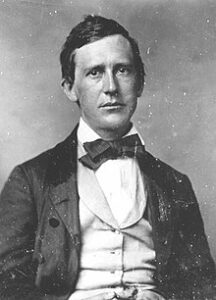 Today is the birthday of Stephen Collins Foster (Lawrenceville, Pennsylvania; July 4, 1826 – January 13, 1864 New York City), “the father of American music”; American songwriter. Foster wrote over 200 songs; among his best-known are “Oh! Susanna”, “Camptown Races”, “Old Folks at Home”, “My Old Kentucky Home”, “Jeanie with the Light Brown Hair”, “Old Black Joe”, and “Beautiful Dreamer”.
Today is the birthday of Stephen Collins Foster (Lawrenceville, Pennsylvania; July 4, 1826 – January 13, 1864 New York City), “the father of American music”; American songwriter. Foster wrote over 200 songs; among his best-known are “Oh! Susanna”, “Camptown Races”, “Old Folks at Home”, “My Old Kentucky Home”, “Jeanie with the Light Brown Hair”, “Old Black Joe”, and “Beautiful Dreamer”.
Lyrics
- Oh I come from Alabama with a banjo on my knee,
I’m going to Louisiana, my true love for to see
It rained all night the day I left, the weather it was dry
The sun so hot I froze to death; Susanna, don’t you cry.
Oh, Susanna, don’t you cry for me
For I come from Alabama,
With my banjo on my knee.- Oh! Susanna, W.C. Peters & Co. (1848).
- Gone are the days when my heart was young and gay,
Gone are my friends from the cotton fields away,
Gone from the earth to a better land I know,
I hear their gentle voices calling “Old Black Joe.”- Old Black Joe, Firth, Pond & Co. (1860).
- Beautiful dreamer, wake unto me,
Starlight and dewdrops are waiting for thee;
Sounds of the rude world heard in the day,
Lull’d by the moonlight have all pass’d away.- Beautiful Dreamer, Firth, Pond & Co. (1862).
- A few more days, and the trouble all will end,
In the field where the sugar-canes grow.
A few more days for to tote the weary load,—
No matter, ‘t will never be light;
A few more days till we totter on the road:—
Then my old Kentucky home, good-night!- My Old Kentucky Home. As quoted at Anthology of American Poetry, by George Gesner, (1983).
- The day goes by like a shadow o’er the heart,
With sorrow where all was delight;
The time has come when we all must part:
Then my old Kentucky home, good night!- My Old Kentucky Home.
Old Folks at Home
- Sadly I roam,
Still longing for the old plantation,
And for the old folks at home. - All up and down the whole creation,
Sadly I roam,
Still longing for the old plantation,
And for the old folks at home. - All the world is sad and dreary,
Everywhere I roam.- As quoted at Family Book of Best Loved Poems, by David L. George, (1952)
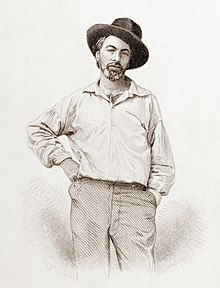
Whitman, age 35, frontispiece to Leaves of Grass. Steel engraving by Samuel Hollyer from a lost daguerreotype by Gabriel Harrison
It was on this day in 1855, Leaves of Grass, a poetry collection by the American poet Walt Whitman (1819–1892) was first published in 1855. Whitman spent most of his professional life writing and re-writing Leaves of Grass, revising it multiple times until his death. This resulted in vastly different editions over four decades—the first, a small book of twelve poems and the last, a compilation of over 400.
The poems of Leaves of Grass are loosely connected, with each representing Whitman’s celebration of his philosophy of life and humanity. This book is notable for its discussion of delight in sensual pleasures during a time when such candid displays were considered immoral. Where much previous poetry, especially English, relied on symbolism, allegory, and meditation on the religious and spiritual, Leaves of Grass (particularly the first edition) exalted the body and the material world. Influenced by Ralph Waldo Emerson and the Transcendentalist movement, itself an offshoot of Romanticism, Whitman’s poetry praises nature and the individual human’s role in it. However, much like Emerson, Whitman does not diminish the role of the mind or the spirit; rather, he elevates the human form and the human mind, deeming both worthy of poetic praise.
With one exception, the poems do not rhyme or follow standard rules for meter and line length. Among the poems in the collection are “Song of Myself”, “I Sing the Body Electric”, and “Out of the Cradle Endlessly Rocking”.
Leaves of Grass was highly controversial during its time for its explicit sexual imagery, and Whitman was subject to derision by many contemporary critics. Over time, however, the collection has infiltrated popular culture and been recognized as one of the central works of American poetry.
I Sing the Body Electric (1855; 1881)
- I sing the body electric,
The armies of those I love engirth me and I engirth them,
They will not let me off till I go with them, respond to them,
And discorrupt them, and charge them full with the charge of the soul.
- The love of the body of man or woman balks account, the body itself balks account,
That of the male is perfect, and that of the female is perfect.
- There is something in staying close to men and women and looking on them, and in the contact and odor of them, that pleases the soul well,
All things please the soul, but these please the soul well.
- The female contains all qualities and tempers them,
She is in her place and moves with perfect balance,
She is all things duly veil’d, she is both passive and active,
She is to conceive daughters as well as sons, and sons as well as daughters.
- The male is not less the soul nor more, he too is in his place,
He too is all qualities, he is action and power,
The flush of the known universe is in him…
- The man’s body is sacred and the woman’s body is sacred,
No matter who it is, it is sacred…
- All is a procession,
The universe is a procession with measured and perfect motion.
- Do you know so much yourself that you call the meanest ignorant?
Do you suppose you have a right to a good sight, and he or she has no right to a sight?
Do you think matter has cohered together from its diffuse float, and the soil is on the surface, and water runs and vegetation sprouts,
For you only, and not for him and her?
- A man’s body at auction,
(For before the war I often go to the slave-mart and watch the sale,)
I help the auctioneer, the sloven does not half know his business.- 1855 version:
A slave at auction!
I help the auctioneer… the sloven does not half know his business.
- 1855 version:
- Gentlemen look on this wonder,
Whatever the bids of the bidders they cannot be high enough for it,
For it the globe lay preparing quintillions of years without one animal or plant,
For it the revolving cycles truly and steadily roll’d.
In this head the all-baffling brain,
In it and below it the makings of heroes.
- This is not only one man, this the father of those who shall be fathers in their turns,
In him the start of populous states and rich republics,
Of him countless immortal lives with countless embodiments and enjoyments.
How do you know who shall come from the offspring of his offspring through the centuries?
(Who might you find you have come from yourself, if you could trace back through the centuries?)
- A woman’s body at auction,
She too is not only herself, she is the teeming mother of mothers,
She is the bearer of them that shall grow and be mates to the mothers.
- Have you ever loved the body of a woman?
Have you ever loved the body of a man?
Do you not see that these are exactly the same to all in all nations and times all over the earth?
- If any thing is sacred the human body is sacred,
And the glory and sweet of a man is the token of manhood untainted,
And in man or woman a clean, strong, firm-fibred body, is more beautiful than the most beautiful face.
- Have you seen the fool that corrupted his own live body? or the fool that corrupted her own live body?
For they do not conceal themselves, and cannot conceal themselves.
- O my body! I dare not desert the likes of you in other men and women, nor the likes of the parts of you,
I believe the likes of you are to stand or fall with the likes of the soul, (and that they are the soul,)
I believe the likes of you shall stand or fall with my poems, and that they are my poems…
- O I say these are not the parts and poems of the body only, but of the soul,
O I say now these are the soul!
A Woman Waits for Me
- A woman waits for me, she contains all, nothing is lacking,
Yet all were lacking if sex were lacking, or if the moisture of the right man were lacking.
- Sex contains all, bodies, souls,
Meanings, proofs, purities, delicacies, results, promulgations,
Songs, commands, health, pride, the maternal mystery, the seminal milk,
All hopes, benefactions, bestowals, all the passions, loves, beauties, delights of the earth,
All the governments, judges, gods, follow’d persons of the earth,
These are contain’d in sex as parts of itself and justifications of itself.
- Without shame the man I like knows and avows the deliciousness of his sex,
Without shame the woman I like knows and avows hers.
- I draw you close to me, you women,
I cannot let you go, I would do you good,
I am for you, and you are for me, not only for our own sake, but for others’ sakes,
Envelop’d in you sleep greater heroes and bards,
They refuse to awake at the touch of any man but me.
- I dare not withdraw till I deposit what has so long accumulated within me.
- I shall look for loving crops from the birth, life, death, immortality, I plant so lovingly now.
- The consequent meanness of me should I skulk or find myself indecent,
while birds and animals never once skulk or find themselves indecent,
The great chastity of paternity, to match the great chastity of maternity,
The oath of procreation I have sworn…- Spontaneous Me (1856; 1867).
Today is the birthday of John de Mirjian (4 July 1896 – 24 September 1928 Long Island, New York); glamour photographer, based in New York, and famous for his images of celebrities, sometimes in risque poses. His brother Arto de Mirjian continued the business after John’s early death.
Gallery
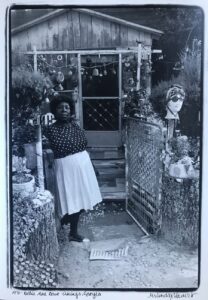 And today is the birthday of Nellie Mae Rowe (Fayette County, Georgia; July 4, 1900 – October 18, 1982); artist. Perhaps best known for her colorful works on paper, Rowe worked across mediums, creating drawings, collages, altered photographs, hand-sewn dolls, home installations and sculptural environments. She was said to have an “instinctive understanding of the relation between color and form.” Her work focuses on race, gender, domesticity, African-American folklore, and spiritual traditions.
And today is the birthday of Nellie Mae Rowe (Fayette County, Georgia; July 4, 1900 – October 18, 1982); artist. Perhaps best known for her colorful works on paper, Rowe worked across mediums, creating drawings, collages, altered photographs, hand-sewn dolls, home installations and sculptural environments. She was said to have an “instinctive understanding of the relation between color and form.” Her work focuses on race, gender, domesticity, African-American folklore, and spiritual traditions.
Rowe is now recognized as one of the most important American folk artists. Her work is held in numerous collections, including The Metropolitan Museum of Art, the Morgan Library and Museum, the American Folk Art Museum in New York City, the Baltimore Museum of Art, the Dallas Museum of Art, the High Museum of Art in Atlanta, Georgia, the Milwaukee Art Museum in Milwaukee, Wisconsin, the Minneapolis Institute of Art, the Museum of Fine Arts, Houston, the Museum of International Folk Art in Santa Fe, New Mexico, the Smithsonian American Art Museum in Washington, D.C., the Schomburg Center for Research in Black Culture in New York City, and the Studio Museum in Harlem.
She was one of ten children. It was noted that she began drawing at an early age. Her family was burdened by financial pressures and she left school after the fourth grade to work in the fields with her father, a former slave, Sam Williams. In addition to managing the rented family farm, her father worked as a blacksmith and basket weaver. Her mother, Luelle Swanson, was an expert seamstress and a quilter. Rowe’s mother taught her to create dolls, quilts and small wooden sculptures.
When Rowe was 16, she ran away from the farm because she found the work to be “painful, poorly compensated and undignified.” Rowe married Ben Wheat right after leaving the family farm. The couple remained in Fayetteville until 1930, when they moved in Vinings, a small rural community northwest of Atlanta. In Vinings, Rowe began to work as a domestic. In 1936 her husband died from cardiovascular renal disease.
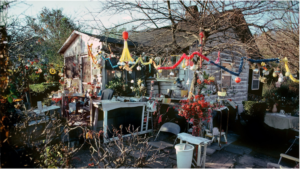 Rowe met her second husband, Henry ‘Buddy’ Rowe, an older widower and fellow Vinings resident in 1937. In 1939, the couple built a home together that Rowe called her “playhouse.” It was located at 2041 Paces Ferry Road. When Henry died nine years later, Rowe, now at the age of forty-eight devoted her full attention to her art making.
Rowe met her second husband, Henry ‘Buddy’ Rowe, an older widower and fellow Vinings resident in 1937. In 1939, the couple built a home together that Rowe called her “playhouse.” It was located at 2041 Paces Ferry Road. When Henry died nine years later, Rowe, now at the age of forty-eight devoted her full attention to her art making.
Over the span of the next three decades, Rowe developed a large body of multifaceted work. In the final decade of her life, her art was shown at local and national galleries and museum. In November 1981, she was diagnosed with multiple myeloma. On October 18, 1982, after spending her final weeks in the hospital, Rowe died. She is buried in the Flat Rock A.M.E. Cemetery in Fayetteville, Georgia.
Gallery
Mac Tag
The hardest thing is to know where and how to give of yourself. Sylvia Plath
You have to be able to make a real creative life for yourself before you can expect anyone else to provide one ready-made for you. Sylvia Plath
The sad, the lonely, the insatiable.
To these Old Night shall all her mystery tell;
W.B. Yeats
I see why men love women. They give them but a little of their lives. But women when they love give everything. Oscar Wilde
I have the one person I could ever love in this world. Now I must work to be a person worthy of that. Syliva Plath
While still I may, I write for you
The love I lived, the dream I knew.
W.B. Yeats
Many a morning hath he there been seen, With tears augmenting the fresh morning dew. Shakespeare
For you and for me the highest moment, the keenest joy, is not when our minds dominate but when we lose our minds and you and I both lose it in the same way, through love. Anais Nin
The world is not imperfect or slowly evolving along a path to perfection. No, it is perfect at every moment, every sin already carries grace in it. Hermann Hesse

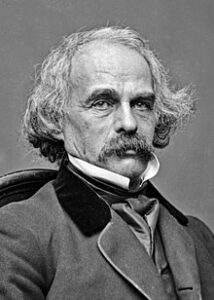
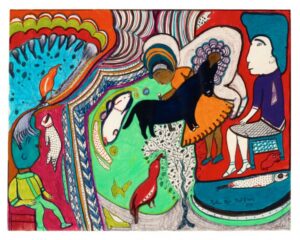
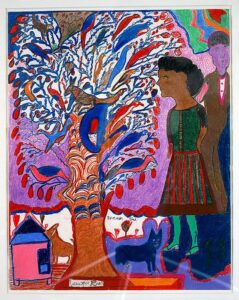
No Comments on "The Lovers’ Chronicle 4 July – another – prose by Nathaniel Hawthorne – Leaves of Grass by Walt Whitman – photography by John de Mirjian – art by Nellie Mae Rowe"